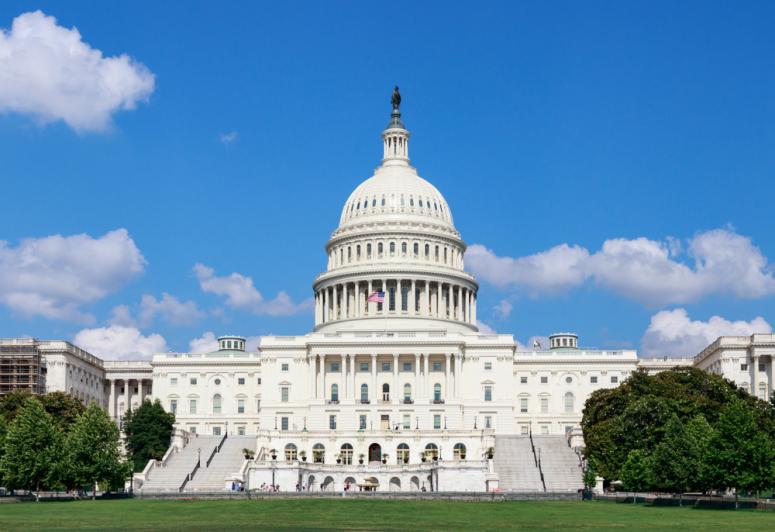
While AcademyHealth is often thought of in relation to conferences like the Annual Research Meeting and the Health Datapalooza/National Health Policy Conference, in our role as the professional home of individuals and organizations who produce and use HSR, we are also the leading advocate for HSR at the federal level.
Our advocacy team supports AcademyHealth’s strategic plan and cross-cutting priorities as approved by our Board of Directors. One of the most visible areas of advocacy is in support of the federal budget process – advocating for robust, sustainable funding for HSR. But advocacy is also about education, and we expend considerable effort working with Congress and federal agencies on issues related to the field of HSR, including promoting research and science innovation, health systems improvement, resilience, capacity, and proactively reducing health disparities, including for racial and socio-economic factors.
The policies that we promote, and how we promote them, are outlined in our policy platform for the 117th Congress, which was developed in consultation with members, unanimously endorsed by our Committee on Advocacy and Public Policy, the Executive Committee, and the Board of Directors. This platform not only uniquely lays out what it means to support HSR in our daily advocacy, but it also provides explanations for where AcademyHealth is a leader in Washington and where we can best support our coalition partners by “signing on” to efforts they lead.
On any subject, the best policy is the one that is informed by evidence and data provided by nonpartisan experts, and AcademyHealth is a known and respected source. To that end, one of the most valuable advocacy resources we have is the expertise of AcademyHealth’s membership. We regularly work with congressional offices in both chambers and parties to organize on- or off-the-record opportunities for staffers to ask our experts questions about current health policy issues. For example, we brought AcademyHealth members to the Hill to headline briefings on subjects from Black maternal health care to equitable vaccine distribution to challenges in health IT systems, and more. We are proud to regularly work with Members of Congress from both parties as they develop legislation that seeks to increase the value and accessibility of health care delivery and promote research.
We also manage the Friends of AHRQ, which is a voluntary coalition of organizations from throughout the health care and research ecosystem that advocates on behalf of AHRQ to Congress. For example more than 120 organizations joined our Friends letter to Congress calling for AHRQ to be fully funded in FY22 at $500 million. This letter has been widely shared on Capitol Hill, and has influenced both congressional appropriations letters and congressional members’ understanding of AHRQ in both chambers. We also organize exclusive access to briefings from senior AHRQ staffers to the Friends, including briefings by the AHRQ Director on their priorities and upcoming programs.
Our federal advocacy is not limited to Congress. Federal agencies issue regulations or major reports through open public processes, such as issuing a request for comment from stakeholders. AcademyHealth closely monitors this process and works with our membership base to promote the needs and values of our community.
- For example, when the National Institutes of Health (NIH) asked for suggestions on how to promote diversity, equity, and inclusion in the biomedical workforce, we worked with members of our Disparities Interest Group leadership as well as the Advisory Group on Diversity, Equity, and Inclusion in order to respond with detailed information about how our organization is grappling with systemic racism in our field, health system, and country, and we identified the bold reforms NIH needs to immediately undertake.
- As the Patient-Centered Outcomes Research Institute (PCORI) implemented instructions in its 2019 reauthorization to better account for costs in health care delivery access, AcademyHealth encouraged them to break down restrictions that hindered or biased topics that are pursued by researchers. We supported the 2019 reauthorization language that emphasized that PCORI-supported research did not preclude cost-related analyses, and in fact clarified the importance of considering costs and burdens in clinical environments.
- When the National Library of Medicine (NLM) at NIH requested input on how to best serve the health services research community, we worked with numerous researchers in our membership to find out which products were helpful, which ones needed to be changed, and how to better promote their resources, and then communicated these findings to NLM.
This is just a small sampling of how AcademyHealth publicly engages with federal agencies. You can find a full record of each of our statements here.
We are a grassroots organization, and our power comes from empowering our membership to be advocates and communicate the latest and best evidence in front of policymakers. If you’d like to learn more about our advocacy for the field, email us at advocacy@academyhealth.org.
In addition, watch for the annual calls for nominations for our Committee on Advocacy and Public Policy, Councils, and Interest Groups. These leadership volunteers are a key source of insight for our comments and statements and a great way to get more involved.